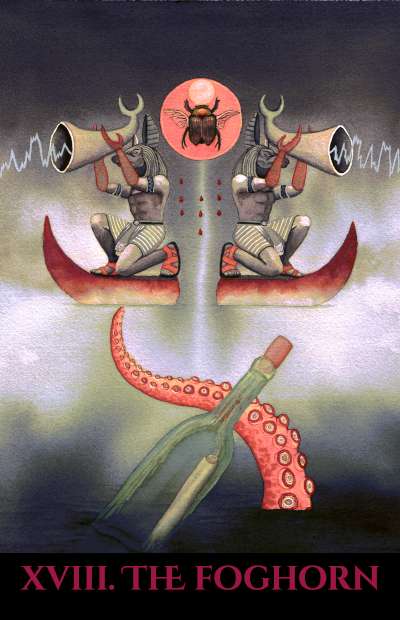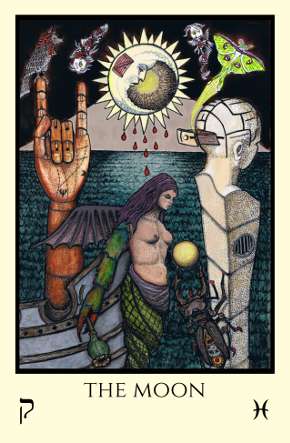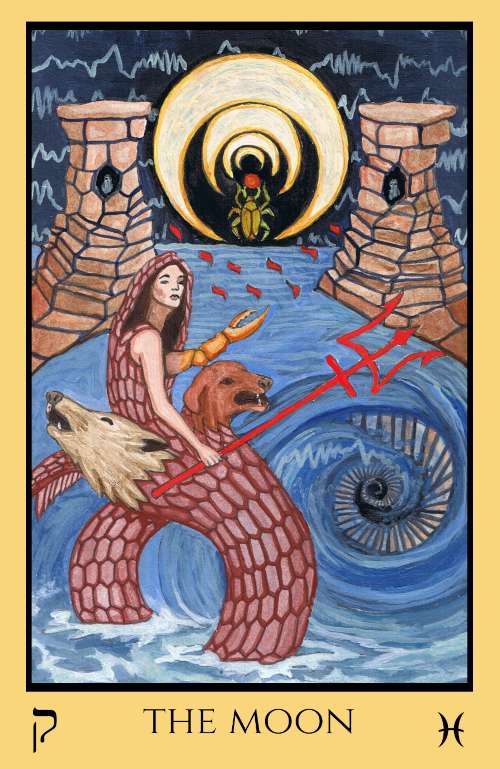What is the meaning of the Moon card in tarot? The enigmatic Moon card is a card of many mysteries and misunderstandings. For one thing, it does not actually correspond to the Moon, our nocturnal luminary, but to the zodiacal sign Pisces. But what does the Moon card mean in a tarot reading? Learn here about how to interpret the mysterious Moon card in your tarot readings. We can say that the Moon card is the Pisces card, but what does that mean?
Context is Key for interpreting tarot cards
Interpreting any card is all about context. Did the Moon card show up as a general “card of the day”? Was it the answer to a specific question, or has it shown up in a particular spread position? Every Major Arcana card tends to encompass an expansive range of topics. The Major Arcana represent the higher forces and things beyond the mundane – some call them “karmic” in nature. Because of their larger range of meaning, the Major Arcana of tarot are often a challenge to interpret. But every tarot Major has (at least) three primary ways that they can be interpreted.
Spectrum Fari, the guidebook for our Pharos tarot, breaks down the Moon card into three possible general meanings:
- Deciphering subconscious messages, determining false from true, dreams, delusion, and illusion
- A laborious passage through the depths, the brink of important psychological change
- Unconscious desires and repressed feelings
The meaning of The Moon card and Pisces
Many of these can be traced to the Moon as the trump of Pisces. Pisces is a Mutable Water sign, and considered to be profound, and elusive. With their considerable extrasensory and mediumistic capabilities, they are receivers of vibrations: “psychic sponges”. Pisces’ modern ruler is dreamy and nebulous Neptune, but the classical ruler is the gaseous and expansive planet Jupiter. Pisces can travel the cosmic heights and the watery depths, obtaining information often invisible to normal modes of being. They often need to work on boundaries as their subconscious is so permeable.
Examples of The Moon card and its meaning in our decks

The Pharos Tarot Moon card shows this ability to retrieve information from the invisible subconscious depths. Its alternate name “The Foghorn” shows the need to listen and to see through the fog, for many dangers lie in these unexplored and murky territories of fantasy and dream.

In Tabula Mundi Tarot, the barge of the Moon card travels through “the gates of horn and ivory” where one learns to discern true dreams from false. The palmistry hand forms the sign of the horns, a gesture to expel demons. The phrenology head with its open drawer illustrates this cards connection to the back of the head and the seat of the subconscious.

The Rosetta Tarot shows the mythical passage between monstrous Scylla the Rapacious and the whirlpool known as Charybdis the Swallower – a path fraught with multiple dangers. All three decks have Moon cards that like the Thoth card have a depiction of the brain waves of sleep, showing the connection with the world of dreams.
The Moon card in Tarot and Qabalah
In the Thoth system, the Moon corresponds to the Hebrew letter Qoph, which means “back of the head” – another suggestion that this is a card of mental processes of which the individual is not fully aware. The path extends from Netzach (Venus, Victory) to Malkuth (Earth; the Kingdom) – that is a message of an illusory challenge.
When the Moon tarot card shows up as your card of the day, you may be on the threshold of profound psychological change, or have a need to see through the fog of delusion.
In Book M, Liber Mundi, the oracle of the Moon tarot card reminds you that you are passing through the gates of dreams. “Take heed to tell the true dreams from illusions. This is the passage through darkness, the darkest hour before the dawn. Stray not from the path of True Will!”
